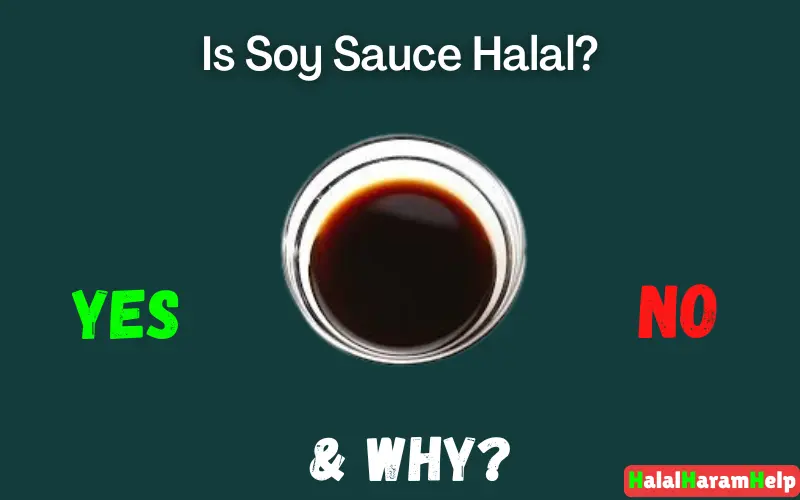Soy sauce is a staple in many kitchens worldwide, used to enhance flavors in countless dishes.
However, for those adhering to Islamic dietary laws, the question arises is soy sauce halal? The answer isn’t straightforward and largely depends on how it’s made and whether it contains haram ingredients.
Some types of soy sauce contain small amounts of haram drinks due to the fermentation process, raising concerns about its permissibility in Islam.
Hence, in this article, we’ll explore the factors determining whether soy sauce is halal or haram, helping you decide when buying it.

Is Soy Sauce Halal?
The short answer is it depends. Soy sauce can be halal or haram depending on how it is produced and the amount of alco** present in it.
In Islam, the permissibility of any food or drink hinges on whether its ingredients and preparation methods align with halal guidelines, especially when it comes to alco**.
You might also like to know is Pectin halal.
Understanding The Role Of Alco** In Soy Sauce
The key factor in determining if soy sauce is halal is its alcohol content. Soy sauce is typically made through fermentation, a process that can naturally result in the formation of alco**
However, the amount of alco** produced and whether it leads to intoxication plays a significant role in determining whether it is halal.
In Islam, the consumption of intoxicants is strictly prohibited, as outlined in the Quran and various hadiths.
Even a small quantity of alco** is considered haram (forbidden) if it has the potential to cause intoxication.
However, soy sauce that contains minimal, naturally-derived alcohol due to fermentation is a grey area, depending on the quantity of alco** and how it is processed.
Also see is Gluten halal.
Halal Soy Sauce: The Alco** Content Threshold
Soy sauce is generally considered halal if its alco** content falls within a range that is non-intoxicating.
For example, if the alco** content in soy sauce is between 1% and 3%, it is usually deemed permissible as this amount does not cause intoxication.
In fact, during the fermentation process, alco** is often an inevitable byproduct, but it is naturally derived from the ingredients (soybeans and wheat) breaking down.
On the other hand, soy sauce that contains more than 3% alco** crosses into haram territory, as the potential for intoxication becomes a concern.
The principle in Islam is clear: anything that has the potential to intoxicate, even in large quantities, is forbidden. As the Prophet Muhammad (PBUH) said in a well-known hadith, “Every intoxicant is haram.”
Therefore, if a soy sauce contains alco** in excess, or if alco** is added artificially, it would no longer be halal and should be avoided by those adhering to Islamic dietary laws.
Fermentation Process And Halal Certification
Most soy sauces undergo a natural fermentation process, which contributes to their unique flavor and consistency.
During this process, enzymes in soybeans and wheat break down starches into sugars, which are then converted into alco**.
However, not all of this alco** remains in the final product. During production, a significant portion of the alcohol evaporates through heating or other stages, leaving behind only trace amounts.
These small traces of alco** typically do not cause intoxication, which is why soy sauce can still be considered halal, provided the alcohol level stays within the permissible range.
Moreover, fermentation is a natural process, and in many halal certifying organizations, alco** that results from this natural fermentation is not viewed in the same light as artificially added alco**.
If you’re very particular about the soy sauce you consume, it’s a good idea to look for halal-certified brands.
A halal certification guarantees that the product has been thoroughly vetted to ensure it complies with Islamic dietary laws. Halal-certified soy sauces typically use production methods that limit or eliminate the alco** content, providing reassurance to consumers.
How To Check If Soy Sauce Is Halal?
When purchasing soy sauce, there are a few steps you can take to ensure it aligns with halal requirements:
1. Check The Alco** Content: Always look at the label to see if alco** is listed as an ingredient or if the bottle specifies the percentage of alco**.
As mentioned earlier, if the alco** content is between 1% and 3% and naturally derived, it is considered halal. However, if the alco** exceeds this amount or is artificially added, the soy sauce is haram.
2. Look for Halal Certification: If the product is halal-certified, it will usually be marked with a logo from an official certifying body.
These organizations ensure that the soy sauce has been made according to Islamic guidelines, eliminating any doubts about its permissibility.
3. Research the Brand: Some soy sauce brands are well-known for catering to halal markets, particularly in Muslim-majority countries. A little research into the brand’s practices can provide more clarity on whether the product is halal.
Soy Sauce Alternatives
For those who are concerned about soy sauce and want to avoid any risk of consuming haram products, there are alternatives available.
Some brands offer non-fermented soy sauce, which eliminates the alcohol formation process. These soy sauce substitutes provide a similar taste without any alcohol content.
Another option is tamari sauce, which is a gluten-free, non-fermented soy sauce alternative.
While tamari is similar in flavor to soy sauce, it doesn’t undergo the same fermentation process and is usually free from alcohol, making it a safe and halal-friendly option for those with dietary concerns.
Also check our blog post on is Gelling Agent halal.
Conclusion
Soy sauce can be halal or haram, depending on the alco** content and how it’s produced.
If the alco** is naturally derived from fermentation and remains between 1% and 3%, it is generally considered halal.
However, if the alco** content is higher or artificially added, it becomes haram.
To ensure you are consuming halal soy sauce, always check the label, look for halal certification, or opt for non-fermented alternatives.
By being mindful of these factors, you can confidently enjoy soy sauce while adhering to Islamic dietary guidelines.


